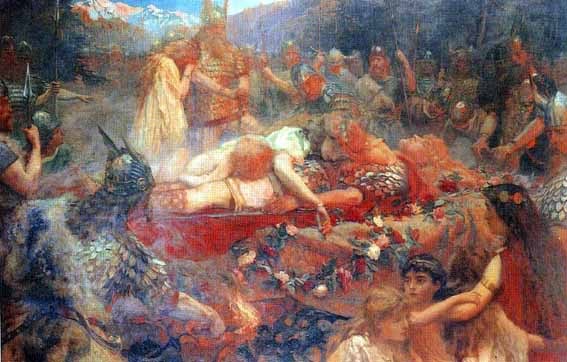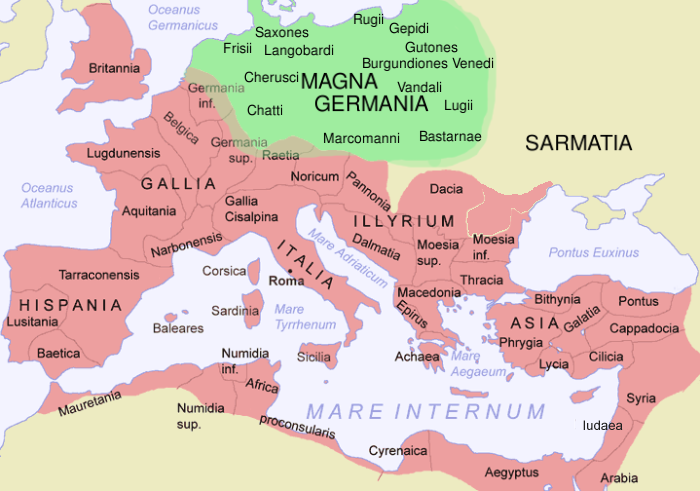Excerpted from the 18th article of William Pierce’s “Who We Are: a Series of Articles on the History of the White Race”:
Christian ethics—the slave morality preached in the Roman catacombs—was like a time bomb ticking away in Europe—a Trojan horse brought inside the fortress, waiting for its season. That season came, and the damage was done. Today Christianity is one of the most active forces working from within to destroy the White race.
From the Christian churches came the notion of “the White man’s burden,” along with the missionaries who saw in every African cannibal or Chinese coolie a soul to be saved, of equal value in the eyes of Jehovah to any White soul. It is entirely a Christian impulse—at least, on the part of the average American voter, if not the government—which sends American food and medical supplies to keep alive swarming millions of Asiatics, Africans, and Latins every time they have a famine, so that they can continue to outbreed Whites.
The otherworldly emphasis on individual salvation, on an individual relationship between Creator and creature which relegates the relationship between individual and race, tribe, and community to insignificance; the inversion of natural values inherent in the exalting of the botched, the unclean, and the poor in spirit in the Sermon on the Mount, the injunction to “resist not evil” — all are prescriptions for racial suicide. Indeed, had a fiendishly clever enemy set out to concoct a set of doctrines intended to lead the White race to its destruction, he could hardly have done better.
The “White guilt” syndrome exploited so assiduously by America’s non-White minorities is a product of Christian teachings, as is the perverse reverence for “God’s chosen people” which has paralyzed so many Christians’ wills to resist Jewish depredations.
Moses Replaces Hermann
Not the least of the damage done by the Christianization of Europe was the gradual replacement of White tradition, legend, and imagery by that of the Jews. Instead of specifically Celtic or German or Slavic heroes, the Church’s saints, many of them Levantines, were held up to the young for emulation; instead of the feats of Hermann or Vercingetorix, children were taught of the doings of Moses and David.
 Europeans’ artistic inspiration was turned away from the depiction of their own rich heritage and used to glorify that of an alien race; Semitic proverbs and figures of speech took precedence over those of Indo-European provenance; Europeans even abandoned the names of their ancestors and began giving Jewish names to their children: Samuel and Sarah, John and Joan, Michael and Mary, Daniel and Deborah.
Europeans’ artistic inspiration was turned away from the depiction of their own rich heritage and used to glorify that of an alien race; Semitic proverbs and figures of speech took precedence over those of Indo-European provenance; Europeans even abandoned the names of their ancestors and began giving Jewish names to their children: Samuel and Sarah, John and Joan, Michael and Mary, Daniel and Deborah.
Despite all these long-term consequences of Christianity, however, the immediate symptoms of the infection which the conquering Germans picked up from the defeated Romans were hardly noticeable. White morals and manners, motivations and behavior remained much as they had been, for they were rooted in the genes—but now they had a new rationale.
Today’s Christian Patriots
And it is only fair to note that even today a fairly substantial minority of White men and women who still think of themselves as Christians have not allowed their sounder instincts to be corrupted by doctrines suited to a following of mongrelized slaves. They ignore the Jewish origins of Christianity and justify their instinctive dislike and distrust of Jews with the fact that the Jews, in demanding that Jesus be killed, became a race forever accursed (“His blood be on us and on our children”).
They interpret the divine injunction of brotherhood as applying only to Whites. Like the Franks of the Middle Ages, they believe what suits them and conveniently forget or invent their own interpretation for the rest. Were they the Christian mainstream today, the religion would not be the racial menace that it is.
Unfortunately, however, they are not: virtually none are actively affiliated with any of the larger, established Christian churches.
♣
Pierce’s book continues for other eight chapters.
I am convinced that the white race won’t be saved
unless whites—agnostics and atheists included—
give up Christian axiology (see: here).

